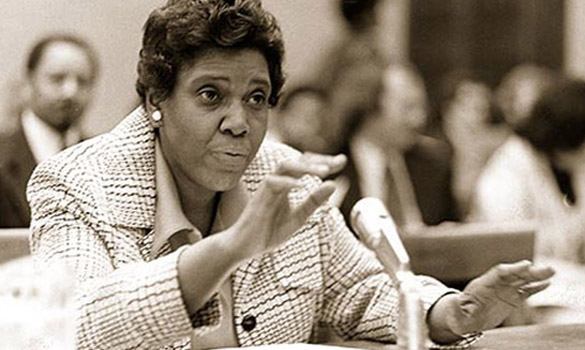BlackHistory365
Sampler
African American / African Diaspora Research and Studies at MIT
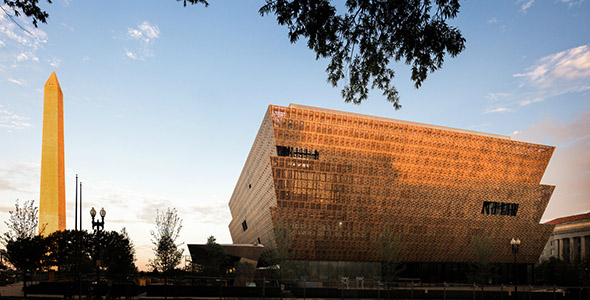
National Museum of African American History and Culture, near the Washington Monument, Washington D.C. | David Adjaye architect | Photo courtesy of the Freelon Adjaye Bond Smith Group JJR team
"Understanding the past is a source for innovation in our own time."
— Melissa Nobles, Kenan Sahin Dean, MIT School of Humanities, Arts, and Social Sciences
HISTORY
Ebony and Ivy | Craig Steven Wilder
In his acclaimed book, Ebony and Ivy, MIT Professor of History Craig Wilder documents the breadth of the economic, social and intellectual entanglements between America’s early universities and the Atlantic economy that was rooted in the slave trade.
Story at MIT News | Wilder website
POLITICAL SCIENCE
Taking full account of the past | Melissa Nobles
With research that illuminates historic episodes of racial and ethnic injustice, political scientist Melissa Nobles has developed a deep understanding of how different nations go about the process of self-examination and attempt to right the wrongs of the past.
Story | Nobles website
LINGUISTICS
Haitian educators and MIT faculty develop Kreyòl-based teaching tools
The MIT-Haiti Initiative led by MIT Professor of Linguistics Michel DeGraff is revolutionizing education in Haiti, and serving as a model for similar projects around the world. Catalyzed by DeGraff’s ground-breaking linguistics research into Kreyòl, the project has the support of a National Science Foundation Grant.
Story by SHASS Communications
HISTORY
How history helps us solve today's issues | Malick Ghachem
"I believe that sustained patience for understanding the local in historical contexts is itself a tool of public policy, a way of seeing and talking about the world, and (if wielded correctly) an instrument of power and justice. One of the principal ways historians can contribute to problem-solving work at MIT and elsewhere is by helping to identify what the real problem is in the first place."
Human Factor series interview
AFRICA AND INNOVATION
ANTHROPOLOGY
Interview with M. Amah Edoh on Africa and Innovation
"Africa today is seen as the future of global innovation and entrepreneurship in areas from technology to the arts. Important questions about Africa’s new visibility include: Who is recognized as an expert? What is seen as innovative, and what knowledge is considered worth carrying forward? Who gets to be the face of this 'New Africa'?"
More
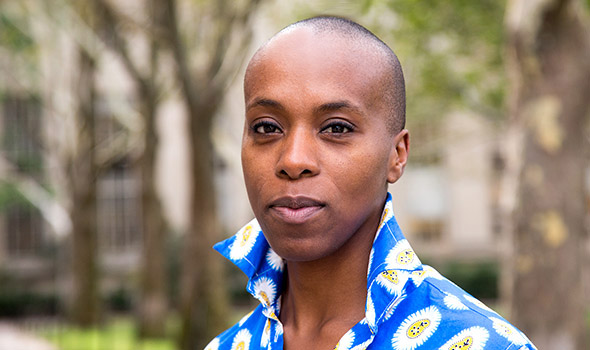
Photo by Jon Sachs / SHASS Communications
"Africa today is seen as the future of global innovation and entrepreneurship in areas from technology to the arts. Important questions about Africa’s new visibility include: Who is recognized as an expert? What is seen as innovative, and what knowledge is considered worth carrying forward?"
FEATURE | MIT AND THE LEGACY OF SLAVERY
Ongoing undergraduate research class and community dialogues
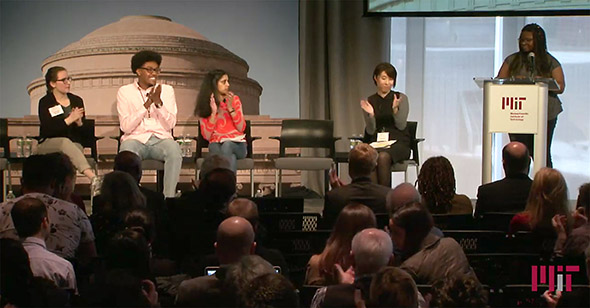
“I believe the work of this class is important to the present — and to the future. What can history teach us now, as we work to invent the future? How can we make sure that the technologies we invent will contribute to making a better world for all?"
— L. Rafael Reif, President of MIT
Visit the MIT and Legacy of Slavery webpage
About
Project catalyzed by President Reif. The first class of the "MIT and Slavery" (21H.S01) undergraduate research project took place in the Fall of 2017. Set in motion by MIT President L. Rafael Reif with SHASS Dean Melissa Nobles, the course was developed and taught by Craig Steven Wilder, the Barton L. Weller Professor of History, and the nation’s leading expert on the links between universities and slavery, in collaboration with Nora Murphy, the MIT Archivist for Researcher Services.
Letter from MIT President L. Rafael Reif
Initial findings. The initial class findings include, among others: insights about the MIT's role in the post-Civil War era of Reconstruction; examples of racism in the culture of the early campus; and the fact that MIT’s founder, William Barton Rogers, owned six enslaved people in Virginia, before he moved to Massachusetts in 1853. Findings will be published in detail on the project website in Spring 2018.
Story | Website | Video
New lines of research.The findings also suggest new lines of research. In a focus on these areas, MIT seeks to contribute to the larger national conversation about the legacies of slavery, and to lead research on the relationship between the slave economies of the Atlantic world, the fields of science and engineering, and U.S. technical institutions. As part of this effort, Professor Wilder is organizing a consortium of U.S technical and science institutions to explore such research in collaboration.
Community dialogue. As the "MIT and Slavery" research class continues, MIT has also launched a Community Dialogue series "to explore together how to address these new dimensions of our past" and to tell a more complete version of MIT history. This project, MIT and the Legacy of Slavery, is led by Melissa Nobles, Dean of the School of Humanities, Arts, and Social Sciences. The first dialogue event, The Early Findings, was held Feburary 16, 2018, and the second, The Task of History, takes place on May 3, 2018.
Story about the first community dialogue: The Initial Findings
Story about the second community dialogue: The Task of History
3Q with Dean Melissa Nobles and Professor Craig Steven Wilder
A community dialogue series is underway as multi-year research continues. The dialogues are an opening chapter in MIT's commitment to researching this history and making it public. A series of events will create campus-wide and community-wide opportunities for shared discussions of the findings and our responses. The first event in this process was held in February, and the second, The Task of History, took place on May 3, 2018.
Interview by SHASS Communications
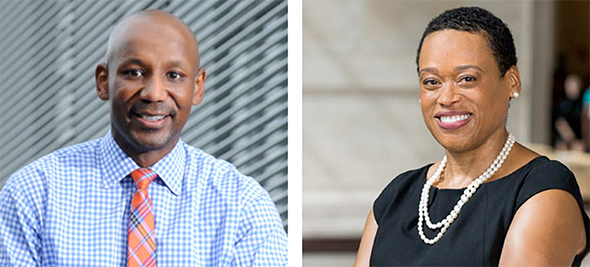
Craig Steven Wilder, Barton L. Weller Professor of History; Melissa Nobles, Professor of Political Science and Kenan Sahin Dean, MIT School of Humanities, Arts, and Social Sciences
RESEARCH
POLITICAL SCIENCE
On Racial Bias | Ariel White
"There's evidence that government is less responsive to people of color... that election officials are less likely to respond to informational questions about voting eligibility when they're sent from Hispanic-sounding names than when they're sent by non-Hispanic white names. These officials didn't respond rudely to Hispanic questioners; they simply didn't write back as often and didn't answer their questions as well."
Commentary
HISTORY + WOMEN'S AND GENDER STUDIES
Historian Kenda Mutongi on Africa, women, power — and human decency
"We need to start taking all forms of African knowledge seriously, because until we do, we will continue to lose out on the contributions of a large swath of humanity."
Interview
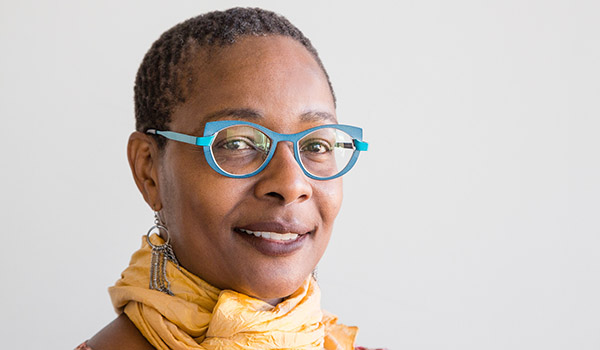
Kenda Mutongi, MIT Professor of History; Photo by Jon Sachs
"Lately I have been trying to think of African history from the perspective of goodness and basic human decency. Of course, conflicts exist, and do a great deal of damage in our lives, and we must confront them — but we must also allow ourselves to appreciate basic goodness and kindness when we see it."
— Kenda Mutongi, MIT Professor of History
COURSES
Black Matters: Introduction to Black Studies
An interdisciplinary survey that draws on history, literature, anthropology, legal studies, media studies, performance, linguistics, and creative writing. Connects the experiences of African-Americans and of other American minorities, focusing on social, political, and cultural histories.
About
Minor in African and Afrian Diaspora Studies
The Minor Program in African and African Diaspora Studies is designed for students interested in the cultures, history, and experiences of the peoples of African descent on the continent, or elsewhere. The minor includes study of socio-economic and political systems and the histories, languages, and literatures.
About
Concentration in African and African Diaspora Studies
The concentration offers a variety of subjects on the history, culture and structure of societies of African descent throughout the world, with special emphasis on those of the United States and the Caribbean. The concentration epxlores the historical, humanistic, political, and social dimensions of ethnicity and race.
About
Barbara Jordan (1936-1996), during the Watergate hearings in U.S. Senate, 1973. Jordan was a stateswoman, member of the U.S. Congress from the 18th District of Texas, keynote speaker for the 1976 National Democratic Convention, and defender of the U.S. Constitution. "There was only one Barbara Jordan," said her colleague Eve Clayton, Representative from North Carolina. "When she spoke, we listened — the world listened.”
Recording:
Barbara Jordan speaking on the extension of the Voting Rights Act
POLITICAL SCIENCE
On the Legacy of Segregation | Melissa Nobles, Tracey Meares
Police shootings and the Black Lives Matter campaign are illuminating the differences that white Americans and Americans of color experience in their everyday lives. Melissa Nobles, Kenin Sahin Dean of MIT-SHASS and Professor of Political Science, joins Yale Professor of Law Tracey Meares at the MIT Communication Forum to discuss the historical and structural forces at work.
Video + Summary
ECONOMICS | INVESTING IN CITIZENS
Q&A | U.S. inequality issues among the “99 percent”
In an article in Science, MIT economist David Autor moves the U.S. inequality discussion beyond the 1% vs. 99% comparison. In the long run, he says, "the best policies we have to combat inequality involve investing in our citizenry. Higher education, and public education, is America’s best idea. Those investments also include preschool, good primary and secondary schools, and adequate nutrition and health care."
Story at MIT News | Autor website
PHILOSOPHY
Philosophy in an inclusive key
Three philosophy graduate students in MIT’s School of Humanities, Arts, and Social Sciences have rolled up their sleeves to tackle the need for more diversity in philosophy programs.
Story by SHASS Communications
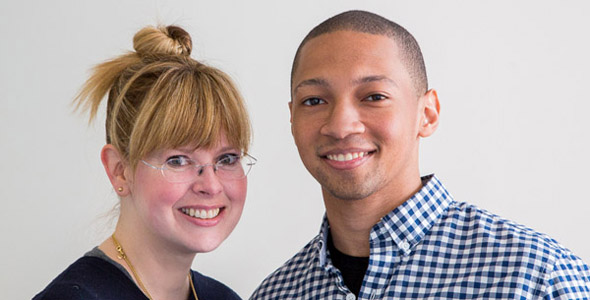
MIT Philosophy graduate students Abby Jacques and Kevin Richardson; photocredit, Jon Sachs
"One thing that makes MIT different from other places: It’s not at all an absurd thing for us to think, ‘There’s a problem here; let’s do something about it.'"
— Kevin Richardson, MIT doctoral candidate in philosophy
MLK VISITING SCHOLARS
Author Ta-Nehisi Coates dazzles during two years at MIT
“What I tell my students is that you here at MIT have access to great knowledge—more knowledge than 99.9 percent of people who have ever been on planet Earth, and I think you have some sort of moral duty to learn how to communicate that. Knowledge is power; power shouldn’t be hoarded."
Story by SHASS Communications | Coates website
LITERATURE
Intellectual property | Sandy Alexandre
Literary scholar Alexandre examines the relationship black Americans have with material possessions — the subject of a new book she is writing.
Story at MIT News | Alexandre website
LITERATURE
Using literature to understand violence against African Americans | Sandy Alexandre
Alexandre’s first book, The Properties of Violence, explores the territorial aspects of violence — including its capacity to uproot blacks and dispossess them of property, while also denying them access to particular places.
Story at MIT News
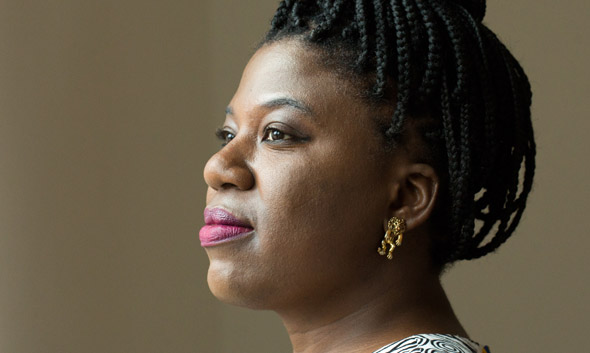
Sandy Alexandre, Associate Professor of Literature; photocredit: Jon Sachs, SHASS Communications
“What I love most about literature is that it facilitates empathy for, and acceptance of, other people. It’s a space of virtual intimacy between human beings that creates the circumstances to enable actual intimacy in the real world.”
— Sandy Alexandre, Associate Professor of Literature
POLITICAL SCIENCE | ADVANCING JUSTICE
3 Questions | Melissa Nobles on advancing racial and restorative justice
Melissa Nobles, Professor of Poltiical Science, and Dean of MIT-SHASS, researches historical injustices in democracies. In this interview, she reflects on what her research suggests about the current efforts to advance civil rights in America.
More
POLITICAL SCIENCE
Interview | Melissa Nobles on the U.S. Census
As America’s decennial headcount gets under way, MIT political scientist Melissa Nobles discusses the history of race and ethnicity in the U.S. Census.
Story at MIT News
WRITING
The Power of Stories | Helen Elaine Lee
"Every few months for twelve years, I have visited a Massachusetts prison to teach creative writing to a group of locked-up men.... It is not my job to unravel the skein of their guilt, to judge or absolve. I am here as a witness. I am here in the name of story and its power to transform." — from "Visible Men"
Essay at the New York Times | Lee website

L to R: Melissa Nobles, Professor of Political Science, and Dean, MIT School of Humanities, Arts, and Social Sciences; Craig Steven Wilder, Professor of History; Helen Elaine Lee, Professor of Writing, and Head Women's and Gender Studies
"I think that we have to revisit these events — no matter how painful that process might be — to challenge the entrenched and embedded inequities of our system...We are ultimately responsible for the system that reproduces these injustices."
— Craig Steven Wilder, MIT Professor of History
HISTORY
Interview with MIT historian Craig Wilder
Wilder served as a consultant on a recent Ken Burns documentary, "The Central Park Five," and also appears in the film, providing historical perspective on the shocking events that began on April 19, 1989, in New York's Central Park.
Interview by SHASS Communications
HISTORY
Uncovering the truth about racism on campus | Craig Wilder
Understanding the current U.S. campus protests over racial injustice requires looking back centuries, explains MIT historian Craig Steven Wilder, whose 2013 book, Ebony and Ivy, explores the historical relationship of American universities to the Atlantic slave trade. In this interview, Wilder discuses how that history informs the Black Lives Matter movement.
Interview at Mother Jones | About Ebony and Ivy | Reviews: New York Times | WSJ
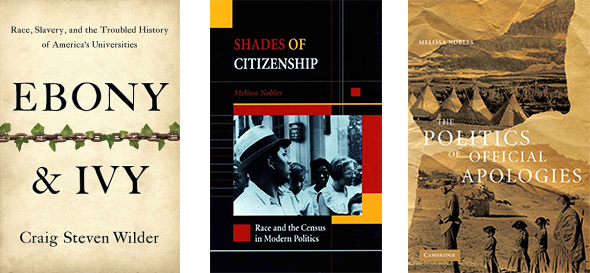
L to R: Ebony and Ivy: Race, Slavery, and the Troubled History of America's Universities, Craig Steven Wilder (Bloomsbury Press, 2013); Shades of Citizenship: Race and the Census in Modern Politics, Melissa Nobles (Stanford University Press, 2000; The Politics of Official Apologies, Melissa Nobles (Cambridge University Press, 2008)
ECONOMICS | THE IMPACT OF INCOME INEQUALITY
Income inequality is costing the U.S. on social issues | Heidi Williams
This New York Times article on the possible public health ramifications of rising inequality cites research by MIT economist Heidi Williams that finds a connection between infant mortality and “excess inequality.”
Article at The New York Times | Williams website
COMPARATIVE MEDIA STUDIES/WRITING
The hidden history of Bengali Harlem | Vivek Bald
MIT professor’s new book details the waves of South Asian immigrants to the United States. “I wanted to make clear the depth and the persistence of the South Asian presence in the U.S.,” Bald says, “and specifically the South Asian Muslim presence in the U.S., at a time when Muslims are being portrayed as newcomers, enemies, and outsiders.”
Story | Bald website
COMPARATIVE MEDIA STUDIES + CSAIL
Designing virtual identities for empowerment and social change
D. Fox Harrell receives $1.35 million in grant funding to advance research at the intersection of social science and digital technology. "Computational systems, Harrell explains — whether in video games, social media, e-commerce accounts, or otherwise — "map elements of ourselves from the real world and our imaginations onto highly structured data." In his work, Harrell explores what is gained, lost, and transformed in that process.
Story by SHASS Communications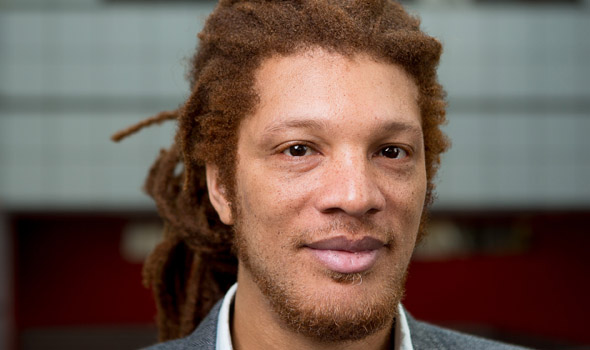
“I’m interested in the ways virtual identities can be used to encourage social change. Artful uses of technologies to imagine ourselves can be a powerful tool for social intervention.”
— D. Fox Harrell, Associate Professor of Digital Media
LINGUISTICS / ANTHROPOLOGY / URBAN PLANNING
Rebuilding Haiti
Haiti’s past casts a long shadow over its future, according to four MIT scholars (all with strong personal ties to Haiti) who spoke at a Starr Forum held to explore the future of the country. Insights from Michel DeGraff, Professor of Linguistics, Erica James, Associate Professor of Anthropology, Cherie Miot Abbanat, Lecturer in the Department of Urban Studies and Planning, and Dale Joachim, a visiting scientist at the MIT Media Lab.
Learn about the keys to Haiti's future
LINGUISTICS
Q&A: Michel DeGraff on teaching STEM in Haitian Kreyòl
MIT Professor of Linguistics Michel DeGraff recently received a $1 million grant from the National Science Foundation for his linguistics research in Haiti, which includes developing classroom tools to teach science and math in Haitian Creole (Kreyòl) for the first time.
Story BY SHASS Communications | DeGraff website
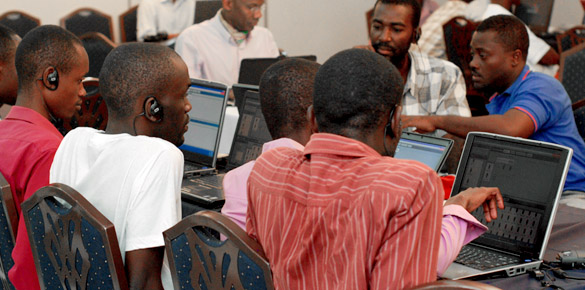
Workshop with Haitian professors of physics and biology
"We are helping create a new lexicon and new tools for science in Kreyòl — and a new culture for deep learning in Haiti."
— Michel DeGraff, Professor of Linguistics at MIT
HISTORY
The Old Regime and the Haitian Revolution | Malick Ghachem
MIT Associate Professor of History Malick W. Ghachem is a historian and a lawyer, whose primary areas of concentration are slavery and abolition, criminal law, and constitutional history. He is the author of The Old Regime and the Haitian Revolution (Cambridge University Press, 2012), a history of the law of slavery in Saint-Domingue (Haiti) between 1685 and 1804.
About the book | Ghachem website
PHILOSOPHY
Studying While Black | Sally Haslanger
"How should we explore the relationship between race and educational opportunity? One approach to the Black-White 'achievement gap' explores how race and class cause disparities in access and opportunity. In this paper I consider how education contributes to the creation of race."
PDF of Paper | Haslanger website
PHILOSOPHY
What is "natural" and what is "social"? | Sally Haslanger
Haslanger argues that gender and race are not purely natural categories, they are also "social constructs." "The supposed line between the 'natural' and the 'social' is of crucial importance for theories of justice: the 'natural' is not as fixed as we might think, and the 'social' can be much more fixed than we imagined. Some differences between us must be respected, and others should be overcome — but which are which?"
Interview by SHASS Communications
Michel DeGraff, Professor of Linguistics, and Head, MIT-Haiti Project; Sally Haslanger, Professor of Philosophy; Malick Gachem, Associate Professor of History
SCIENCE, TECHNOLOGY, AND SOCIETY
Conference asks 'what's the use of race?'
"Most social scientists agree that racial categories are arbitrary labels that we use to carve up human diversity into manageable chunks, and that race will always be much more of a social phenomena than a biological one," said David Jones, a former associate professor in the Program in Science, Technology and Society.
Story at MIT News
ANTHROPOLOGY | MATCHING AID TO NEEDS
Getting aid right in Haiti | Erica Caple James
In her book Democratic Insecurities: Violence, Trauma, and Intervention, MIT anthropologist Erica James examines the psychological damage inflicted on the island nation’s inhabitants and makes recommendations to help better match aid to needs. “There is typically a disconnect between what people are experiencing on the ground and what is perceived at the administrative level,” James says. “There needs to be much more involvement by high-level decision-makers with people in local communities.”
Story at MIT News | James website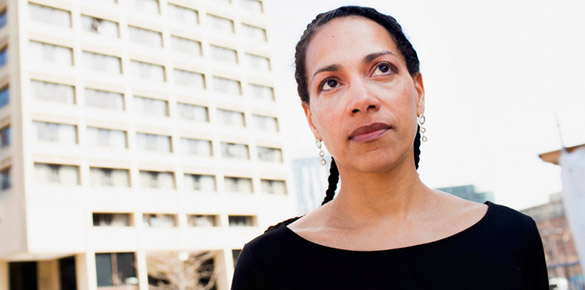
Erica Caple James, MIT Associate Professor of Anthropology and Urban Studies; photocredit: M. Scott Brauer
"As a medical anthropologist, James traces how illness unfolds in the specific contexts of family, social network, and community, and brings to light 'the human experience of health.' In particular she has focused on the struggles of Haitians in the face of a series of natural disasters, disease outbreaks, and government-sponsored violence."
Suggested Links
Introduction to Black Studies
Free course materials at MIT OpenCourseWare
Minor in African and African Diaspora Studies
MIT SHASS Course of study
Sampler of MIT Research on Work and Economic Equity
Collected stories
MIT | Institute Community and Equity Office
The ICEO mission is to advance a respectful and caring community that embraces diversity and empowers everyone to learn and do their best at MIT.
Website
The MIT Black History Project
Website
MLK Programs at MIT
Visiting Scholars, Annual Events, Leadership Award, Videos, Design Seminar
Webpage to all programs
Book recommendation from the MIT Libraries
The Radical King (Beacon Press, 2015)
MIT-SHASS Bookshelf
Faculty books, recordings, and publications
